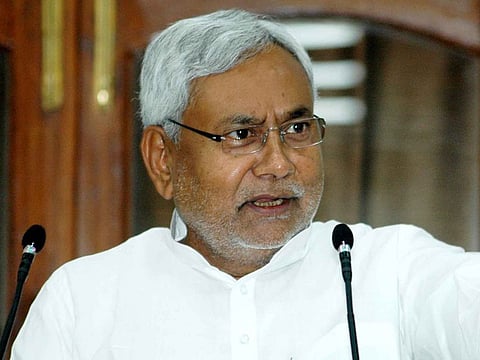Is Nitish destined to be perpetual No.2?
Chief minister of the Indian state of Bihar has harmed his reputation with his constantly shifting loyalties

The aphorism “know thyself” was explained by Greek philosopher Socrates as a phrase that referred to an “unexamined life”. The rumours about Nitish Kumar’s plans provoke the query whether the Chief Minister of the Indian state of Bihar has carefully examined his life in politics.
Nitish’s political journeys have moved him away from his friend Laloo Prasad Yadav during the days of Jayaprakash Narayan’s anti-Congress agitation to Atal Bihari Vajpayee’s government at the Centre and an alliance with the Bharatiya Janata Party (BJP) in Bihar, to Laloo again as a part of an anti-BJP Mahagathbandhan (grand alliance) in Bihar and then back to the BJP.
There is speculation that Nitish may return to the Mahagathbandhan again. The latest conjecture, which gave rise to the possibility of an electoral contest between Prime Minister Narendra Modi and Nitish in Varanasi in 2019, is his reported unhappiness over the treatment by the Modi dispensation.
A sign of Nitish’s displeasure was his refusal to engage on the International Yoga Day, which the BJP observes with fanfare. He has also been sending out signals that he will dictate the seat-sharing with the BJP in his state in 2019. It’s a clear sign that he is spoiling for a fight. Nitish’s recent phone call to Laloo to enquire after his health has added grist to the rumour mills, although Tejashvi (Laloo’s son) has rejected Nitish chacha’s (uncle) return to the alliance with the Rashtriya Janata Dal (RJD) and the Congress. Reports say that the BJP’s current by-election defeats have encouraged Nitish to assert himself to secure a better bargain.
Against the backdrop of the Rashtriya Swayamsevak Sangh’s reported advice to the BJP to be more accommodative towards its allies (it prompted BJP president Amit Shah to have a closed-door meeting with Shiv Sena’s Uddhav Thackeray while Maharashtra Chief Minister Devendra Fadnavis waited outside), Nitish probably decided that the time has come to flex his muscles. He also may not be averse to playing both sides since sections in the Congress are reported to be willing to let him return to the “secular” fold.
Whatever be the outcome, it is undeniable that Nitish has harmed his reputation by being the subject of such rumours. No other well-respected politician in the recent past has been associated with so many manoeuvres that could be described as floor-crossing. A senior leader like Nitish cannot seem to choose the right ally and the treatment at the hands of new friends seems to fall short of his expectations. It happened in the days of the Mahagathbandhan after trouncing the BJP in 2015 and recurred two years later after he joined the BJP. On both occasions, he felt that being the chief minister was not enough and he was not treated with respect.
Nitish is disadvantaged by the lack of a strong support base. Being a Kurmi, a backward caste that constitutes four per cent of Bihar’s population, he was unable to match the social and political clout of the Yadavs, who make up 14.4 per cent — the largest caste in the state — when he was in the Mahagathbandhan. Now, as a BJP ally, Nitish appears unable to cope with the overbearing nature of the Modi-Amit Shah duo. He must have realised that fate marks him out to be a No 2 person wherever he is, notwithstanding his reputation as “Sushashan Babu” or a person known for delivering good governance.
Nitish’s present status is shaky: He is ill at ease in the BJP’s company, and the “secular” camp is not waiting with open arms. The former poster boy of the national opposition and a potential prime minister is at a loose end. Nitish’s failure to know his strengths and weaknesses while taking a hard look at his options in a sharply polarised atmosphere has led him down a blind alley.
— IANS
Amulya Ganguli is a political analyst in India.



